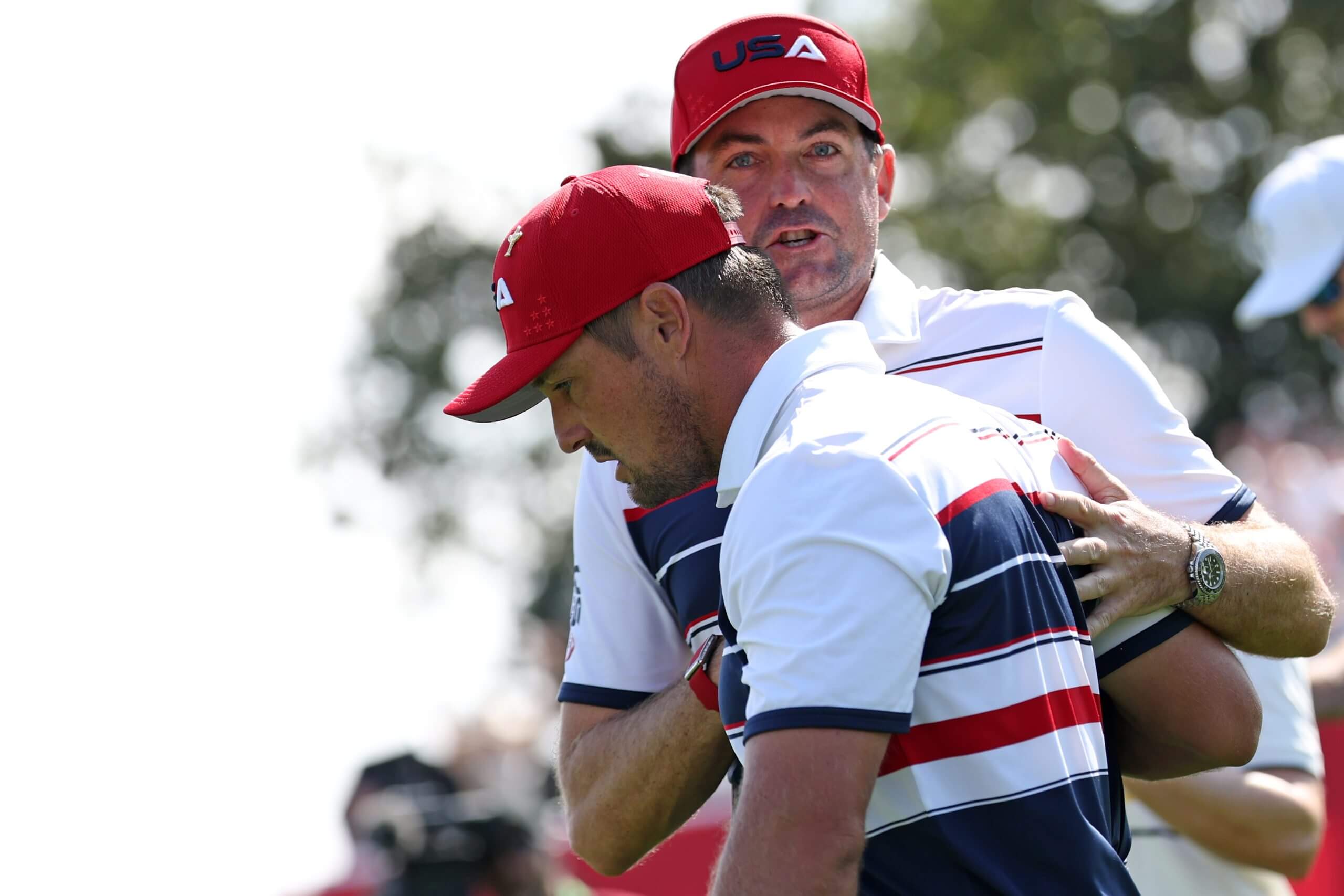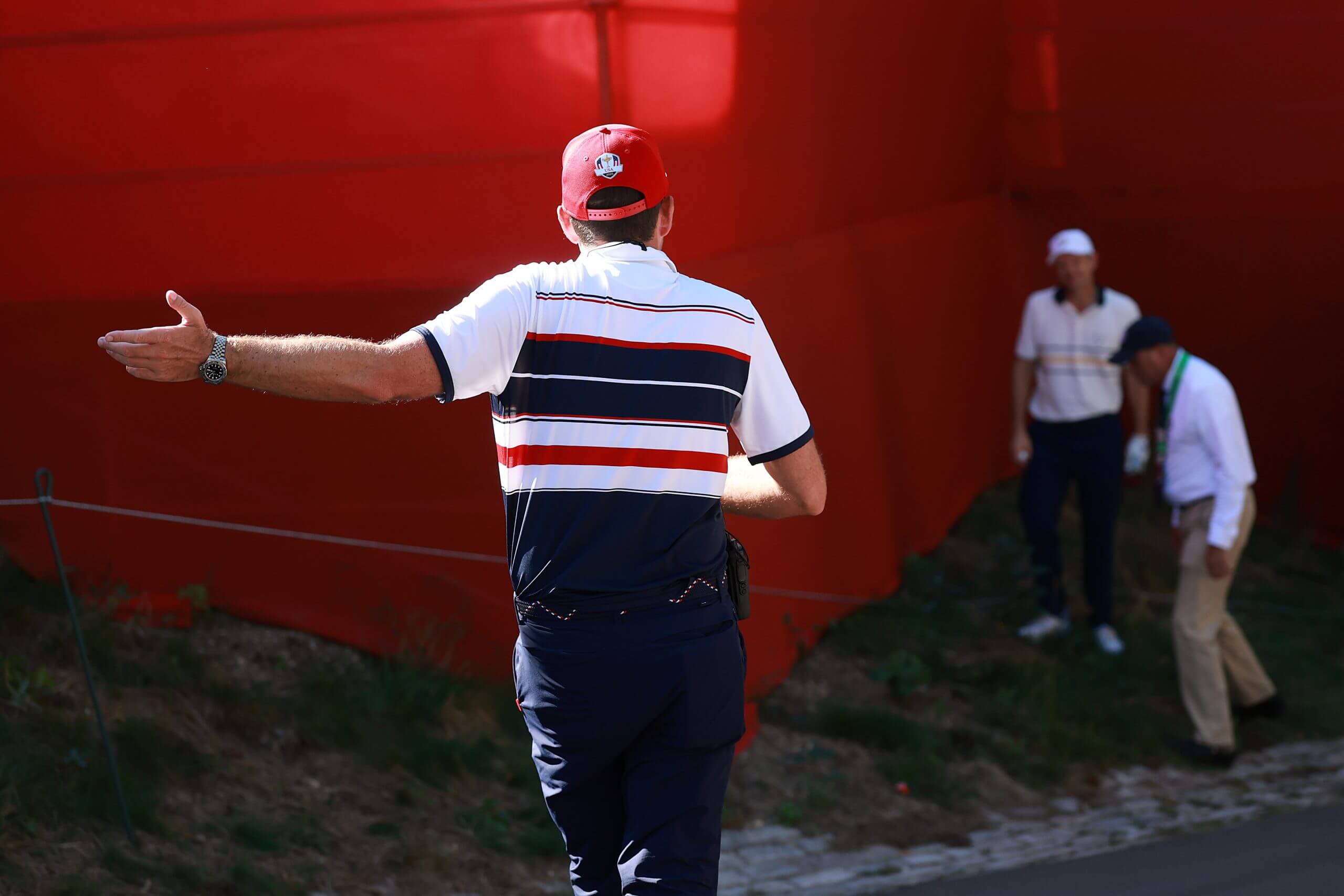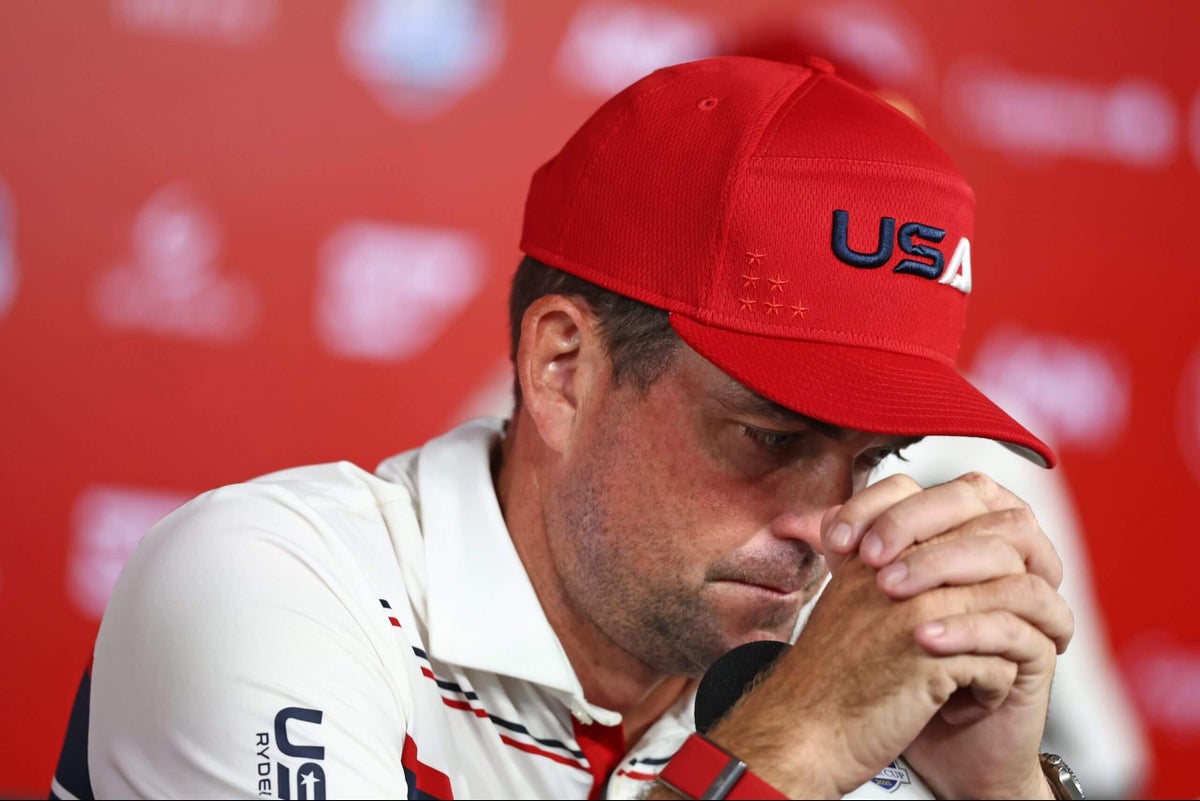FARMINGDALE, N.Y. — If you believed, be it for one hour, or one minute, or one second, that it might happen, that the United States team might do it, might really do it, might conjure a comeback win so inconceivable that everyone from the 2004 Boston Red Sox to the 2016 New England Patriots would need to come and bow in approbation, that they might pull off the greatest victory in Ryder Cup history, then imagine being Keegan Bradley.
This was the American captain who was never supposed to be captain. This was a guy from tiny Woodstock, Vt., who never sat at the cool kids’ table on the PGA Tour, whose journeyman pro golf career long ago surpassed his wildest expectations. This was the guy who got a call he never expected, got handed a theoretically unlosable home Ryder Cup and a roster of American stars, and was told, essentially, “Don’t screw it up.”
Bradley never asked for any of this.
He got it anyway.
The result? Three days spent chewing his nails down to nubs and having to answer for why world-class stars such as Scottie Scheffler and Bryson DeChambeau — players he competed against all year — weren’t making putts. The consequence? Coming face-to-face with the possibility of wearing the Scarlet Letter of a losing captain of a home Ryder Cup. Ol’ Zach Johnson has spent the past two years in the awkward air of bungling the Americans’ 2023 trip to Rome. It’s not a pleasant place.
What was possibly going through Bradley’s mind late Sunday afternoon? When the day began, an 11 1/2 to 4 1/2 deficit set him up to be a laughingstock. By the time winning points were rattled off by Cameron Young, Xander Schauffele, Justin Thomas and Scheffler, it offered relief that a historic margin wasn’t imminent. But then points kept coming. And more matches remained in play. And putts kept falling. And waves of fans collided into a sea of bodies pouring over holes 15, 16, 17 and 18. And in a moment of enchantment, it wasn’t hard to look up, see 13-10 on the scoreboard and think it might happen.
The U.S might win.
And Keegan Bradley might be Mike freakin’ Eruzione.
But then the golden hour ended and the Europeans celebrated. The cold reality of a 15-13 loss. The harsh taste of a blunder at Bethpage Black.
What comes next is what always comes next: sorting the laundry and assigning the blame. In the easy version, the set of matches that required the least decision-making by the captain — rolling out a sequence of players for Sunday singles — resulted in the Americans winning 8.5 of an available 11 points, while the four-team sessions Friday and Saturday (reliant on Bradley creating pairings and making hard decisions) produced 4.5 of an available 16 points.
The pairing of Collin Morikawa and Harris English was a bad idea. Running it back the following day? Well, that was malpractice. Other decisions can be similarly poked and prodded. Bradley didn’t shy away from the weight. Easifying Bethpage, he said, “wasn’t the right decision.”
“Definitely made a mistake on the course setup,” he added.
So, yes, blame Bradley.
It’s easy. It’s convenient.
That is, if you’re OK ignoring the uncomfortable truth that this American Ryder Cup loss actually began nearly 15 months ago, a mere 35 miles away from here. Back when Bradley was first introduced as the U.S. team captain, it was a stunning development seemingly out of nowhere. As it goes when things emerge from such places, the roots of the reason all stemmed from dysfunction. That’s why, during a Times Square news conference in July 2024, when Bradley was asked why he was chosen as U.S. captain, he could only tell the truth.
“I don’t know,” he responded. “I’m still figuring that out.”
Not exactly inspiring stuff, right?
Not exactly the words of someone who should be carrying the bulk of the blame for what happened at Bethpage?
Bradley isn’t the reason for the Americans’ erratic showing in the Ryder Cup. If anything, he’s the collateral damage of the shortsighted, illogical and borderline unfair decision made to choose him in the first place.
Early Sunday, when it seemed a brief, embarrassing final session of the Ryder Cup would soon end the Americans’ misery, I sent a text to a veteran PGA Tour player, someone well familiar with the machinations of professional golf’s caste system.
“It was doomed from the start,” he responded. “Keegan was in a terrible spot.”

Keegan Bradley did everything he could to manage peers like Bryson DeChambeau. (Richard Heathcote / Getty Images)
Let’s remember how this all began. Tiger Woods was theoretically supposed to be the American captain at Bethpage. Why? Well, he’s Tiger Woods. It was assumed Woods would take his turn following the Americans’ no-show performance at Marco Simone in 2023. What better timing? But time passed. And more time passed. No word from Tiger. Assumptions turned into anxiety. Next thing you knew, Woods was in the middle of PGA Tour-PIF negotiations and out of the captaincy conversation.
The next obvious choice? Well, that’d be Phil Mickelson, who once upon a time would’ve been a beguiling pick for Bethpage. But that was back when the world was a simpler place and Mickelson wasn’t the saboteur of professional golf’s social stratum.
In the end, as The Athletic’s Gabby Herzig reported in July 2024, the decision to tab Bradley stemmed from a video call during the Travelers Championship between outgoing PGA of America CEO Seth Waugh, veteran players Justin Thomas and Jordan Spieth, PGA of America president John Lindert, vice president Don Rea and U.S. team manager John Wood. The group kicked around a bunch of names. Nothing inspiring. Then Waugh — days away from announcing he would be stepping down from his PGA role — threw out a flier. Bradley’s name drew a 10-second pause from everyone on the call.
Sure, they thought. Why not? He’ll do it.
Never mind that, despite being in his late 30s, Bradley was playing some of the best golf of his career and attempting to make the Ryder Cup team, not lead it. Never mind that after being snubbed by the 2023 Ryder Cup team, he was now being asked to clean up the mess.
Never mind that he was essentially being put in an impossible position. What was he supposed to do upon being asked to be Ryder Cup captain? Say no? How would that go over?
Never mind that being the youngest captain since Arnold Palmer in 1963 would require him to balance his playing career with the time demands of being a Ryder Cup captain while also tending to his young family.
There’s a reason Bradley’s selection seemed so random. It’s because it was.
“I don’t think I’ll ever be more surprised by anything in my entire life,” Bradley said back at that first news conference.
The PGA of America said the decision to pick Bradley was a chance to “rip the Band-Aid off” and start a new post-task-force era.
That sounded all well and good, but typically when one removes a Band-Aid, the wound is already healed. In this case, the PGA of America yanked it off without knowing what was underneath. There was no actual plan. The only goal was to find a body to fill the spot. Bradley knew Bethpage from his college days at St. John’s, played on three past teams and had a viral Netflix moment when he was left off the 2023 team. That worked. He made for a good story. And he wouldn’t say no.

Keegan Bradley pushed on Sunday, even arguing with a rules official. (Carl Recine / Getty Images)
It sure seems, in hindsight, that no one ever stopped to think how unreasonable it would be for an active player to decide captain’s picks and player lineups among guys he sees on tour every week. How absurd it was for him to have to pick a fellow player to sit for Sunday singles. How irrational it was to ask him to find time to study course setup, player data and historical results.
Bradley, to his credit, navigated things reasonably well. But none of that mattered when the caps were coming off and Americans were congratulating Europeans. When the losses added up, they turned this Ryder Cup into something that will stick to Bradley more than any other individual.
You want to believe he thinks it was worth it, but just like his feelings on Sunday, it’s impossible to know.
“I wouldn’t trade any of this for a second,” he said early Sunday evening, surrounded by his U.S. players. “I woke up every day excited to do this. It turned me into a different person that I am today. I am very thankful for these guys.”
All 12 clapped, realizing that, instead of giving Bradley one of the greatest comebacks in sports history and a legacy that would reframe his life, all they could do was acknowledge the job he did. Whether he wanted it or not.
(Top photo: Jared C. Tilton / Getty Images)

